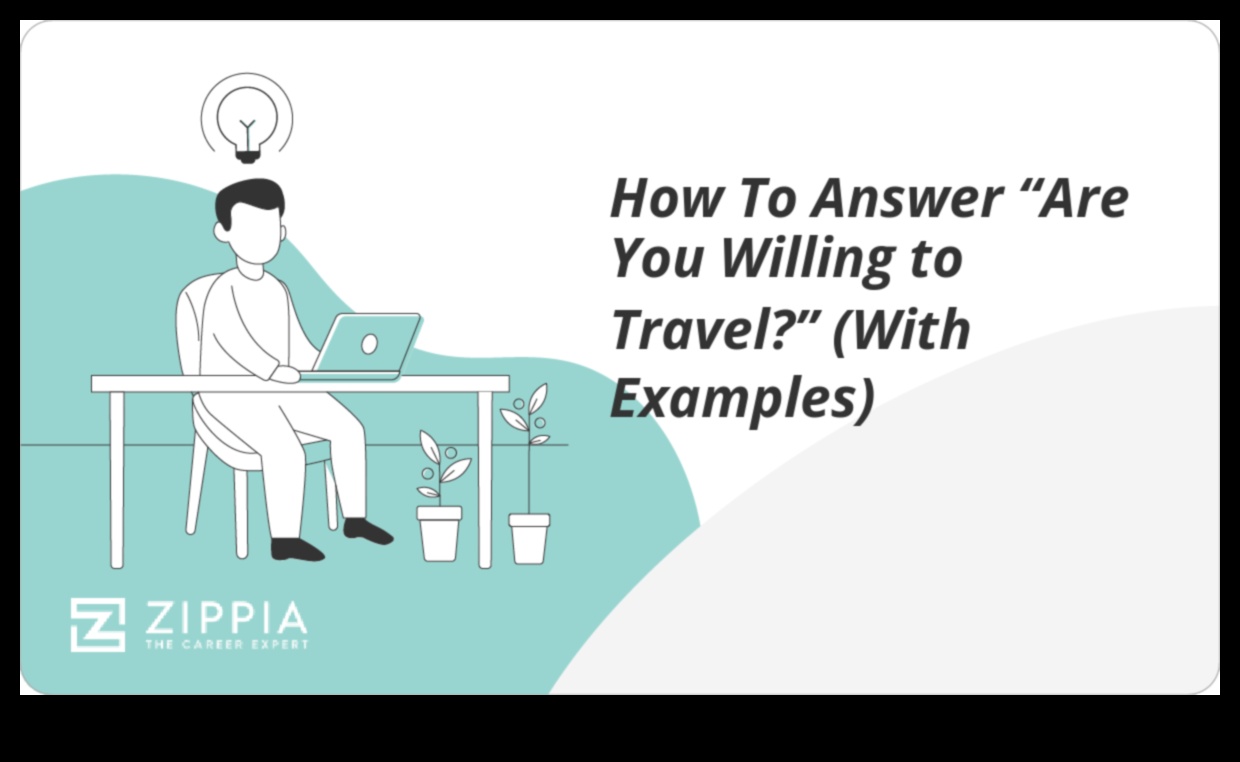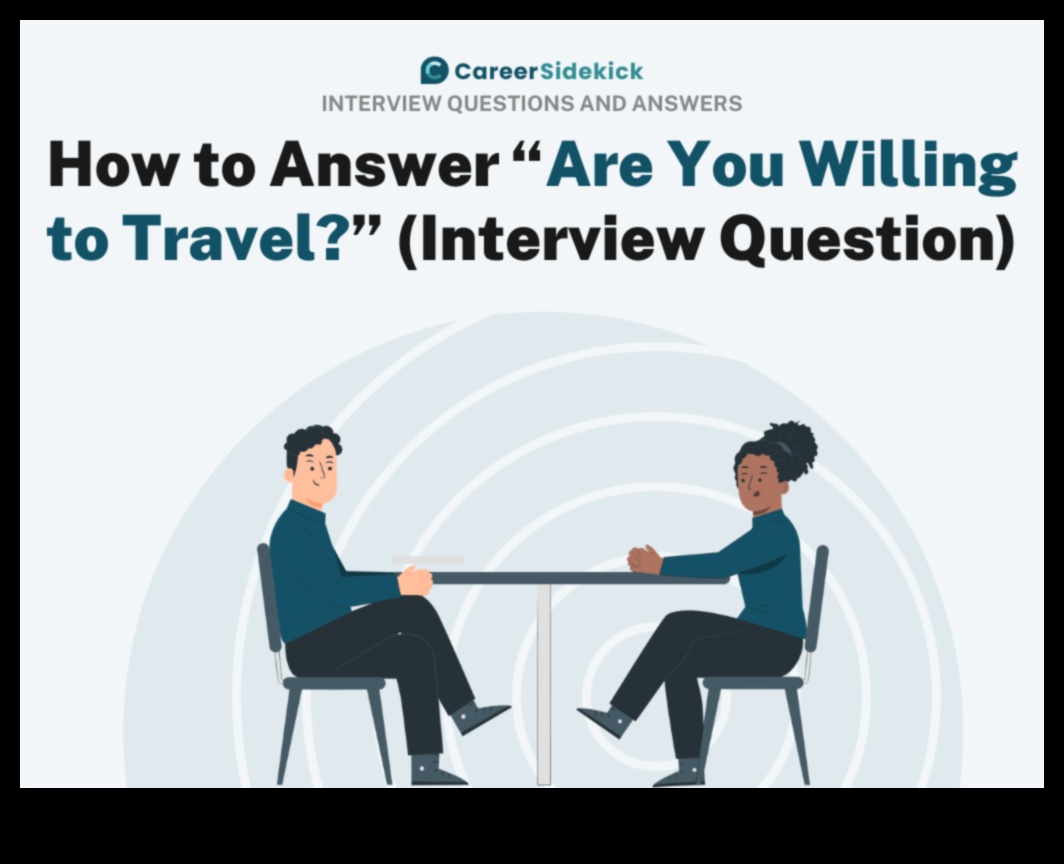
Are You Willing to Travel for Work?
Traveling for work can be a great opportunity to see new places and experience different cultures. However, it can also be challenging, especially if you have to be away from home for long periods of time.
In this article, we will discuss the benefits and drawbacks of traveling for work, how to decide if you are willing to travel, and how to negotiate a travel policy with your employer.
Benefits of Traveling for Work
There are many benefits to traveling for work, including:
- Seeing new places and experiencing different cultures
- Meeting new people and making new friends
- Developing new skills and perspectives
- Advancing your career
- Getting a break from your everyday routine
Drawbacks of Traveling for Work
There are also some drawbacks to traveling for work, including:
- Being away from home for long periods of time
- Dealing with jet lag
- Adjusting to different cultures
- Being exposed to new diseases
- Dealing with the challenges of living in a foreign country
How to Decide if You Are Willing to Travel for Work
If you are considering a job that requires travel, it is important to carefully consider the benefits and drawbacks to make sure that it is the right fit for you.
Here are some things to think about:
- How much time are you willing to spend away from home?
- How well do you handle jet lag and other travel-related challenges?
- Are you comfortable living in a foreign country?
- How will travel affect your personal relationships and your social life?
If you are still unsure about whether or not you are willing to travel for work, it may be helpful to talk to someone who has experience with this type of work. You can also try to find a job that allows you to travel for short periods of time, so that you can get a taste of what it is like before you commit to a long-term position.
How to Negotiate a Travel Policy with Your Employer
If you are offered a job that requires travel, it is important to negotiate a travel policy with your employer. This will help to ensure that you are aware of your rights and responsibilities as a traveling employee.
Here are some things to consider when negotiating a travel policy:
- How much travel will be required?
- How long will you be away from home for each trip?
- What expenses will be covered by your employer?
- What benefits will you receive as a traveling employee?
It is important to be prepared to negotiate and to be willing to compromise. If you are not happy with the travel policy that your employer offers, you may want to consider looking for a different job that does not require travel.
How to Prepare for a Long-Term Work Trip
If you are about to embark on a long-term work trip, there are a few things you can do to prepare yourself.
Here are some tips:
- Do your research on the country or region you will be visiting.
- Learn the local
Topic Answer Job application Many jobs require travel, so it is important to be willing to travel if you want to find a job. Travel Traveling for work can be a great way to see new places and experience different cultures. Willingness to travel You should be willing to travel if you want to find a job that requires travel. Relocation Some jobs require relocation, so you should be prepared to move if you want to find a job that requires relocation. Job search You can find jobs that require travel by searching online job boards, networking with people in your field, and attending job fairs. 
II. Benefits of traveling for work
There are many benefits to traveling for work, including:
- Seeing new places and experiencing different cultures
- Meeting new people and building relationships
- Developing new skills and perspectives
- Expanding your career opportunities
- Gaining a sense of accomplishment
Traveling for work can also be a great way to relieve stress and recharge your batteries.
If you are considering a job that requires travel, it is important to weigh the benefits of travel against the potential drawbacks before making a decision.
III. Drawbacks of traveling for work
There are a number of drawbacks to traveling for work, including:
- Cost
- Time
- Stress
- Lack of sleep
- Family and relationship issues
- Health problems
It is important to weigh the benefits and drawbacks of traveling for work before you decide if it is right for you.

IV. How to decide if you are willing to travel for work
There are a number of factors to consider when deciding if you are willing to travel for work. These include:
- The length of the trips
- The frequency of the trips
- The destinations of the trips
- The costs of the trips
- The impact of the trips on your personal life
Once you have considered all of these factors, you can make an informed decision about whether or not you are willing to travel for work.

V. How to negotiate a travel policy with your employer
When you are offered a job that requires travel, it is important to negotiate a travel policy with your employer. This will ensure that you are aware of the company’s expectations and that you are comfortable with the terms of the agreement.
Here are some tips for negotiating a travel policy with your employer:
- Do your research. Before you start negotiating, make sure you understand the company’s travel policy and what is typically offered to employees. This information can be found in the employee handbook or by asking your manager or human resources department.
- Be prepared to compromise. It is unlikely that you will be able to get everything you want in a travel policy negotiation. Be prepared to compromise on some points in order to reach an agreement that is acceptable to both you and your employer.
- Be assertive. It is important to be assertive when negotiating a travel policy, but you should also be respectful of your employer’s position. Be clear about your needs and be willing to walk away from the negotiation if you are not satisfied with the terms.
Once you have negotiated a travel policy with your employer, it is important to follow the terms of the agreement. This will help to ensure that you are able to travel for work without any problems.
Here are some tips for following a travel policy:
- Book your flights and accommodations in advance. This will help you to get the best rates and avoid any last-minute surprises.
- Stay within your budget. When you are traveling for work, it is important to stay within your budget. This means being mindful of your spending and avoiding unnecessary expenses.
- Follow the company’s travel guidelines. The company’s travel guidelines are designed to help you travel safely and efficiently. Make sure you read and understand the guidelines before you travel.
By following these tips, you can negotiate a travel policy that is fair and beneficial to both you and your employer. You can also ensure that you are able to travel for work without any problems.
VI. How to prepare for a long-term work trip
Preparing for a long-term work trip can be a daunting task, but it is important to do your research and planning in order to make the experience as smooth as possible. Here are a few tips to help you get started:
-
Set realistic expectations. It is important to remember that you will not be able to do everything you would normally do at home while you are on a long-term work trip. This is your chance to relax and experience a new culture, so don’t try to cram too much into your itinerary.
-
Do your research. Learn as much as you can about the country or region you will be visiting. This will help you to make the most of your time and avoid any potential problems.
-
Get the necessary vaccinations and visas. Some countries require visitors to have certain vaccinations, so be sure to check the requirements before you travel. You may also need to apply for a visa, so allow plenty of time for this process.
-
Pack carefully. You will need to pack a variety of items for a long-term work trip, including business clothes, casual clothes, and comfortable shoes. Be sure to also pack any essential toiletries and medications.
-
Learn the local language. Even if you don’t speak the local language fluently, it will be helpful to learn some basic phrases. This will make it easier to communicate with locals and get around.
-
Get familiar with the local culture. It is important to be respectful of the local culture when you are on a long-term work trip. This means learning about the customs and traditions, and dressing appropriately.
-
Stay safe. Take precautions to stay safe while you are on a long-term work trip. This includes being aware of your surroundings, avoiding dangerous areas, and taking care of your personal belongings.
By following these tips, you can help to make your long-term work trip a success.
How to stay healthy while traveling for work
Traveling for work can be exciting, but it can also be challenging. One of the biggest challenges is staying healthy while you’re on the road. Here are a few tips to help you stay healthy while traveling for work:
- Get enough sleep. It’s important to get at least 7-8 hours of sleep each night, even if you’re jet-lagged.
- Eat healthy foods. Avoid processed foods and sugary drinks. Stick to fruits, vegetables, and whole grains.
- Stay hydrated. Drink plenty of water, even if you don’t feel thirsty.
- Exercise regularly. Even a short walk each day can help to improve your circulation and reduce stress.
- Take care of your mental health. Traveling can be stressful, so it’s important to take some time for yourself each day to relax and de-stress.
By following these tips, you can help to stay healthy and happy while traveling for work.
How to deal with the challenges of traveling for work
Traveling for work can be a challenging experience, but it can also be a rewarding one. Here are some tips for dealing with the challenges of traveling for work:
- Plan ahead. The more you can plan for your trip, the less stressful it will be. Make sure to book your flights, accommodations, and transportation in advance.
- Pack light. You don’t want to be weighed down by a heavy suitcase. Pack only the essentials, and make sure to leave room for souvenirs.
- Stay healthy. It’s important to stay healthy while you’re traveling, especially if you’re going to be in a different time zone or climate. Drink plenty of water, eat healthy foods, and get plenty of rest.
- Be flexible. Things don’t always go according to plan when you’re traveling. Be prepared for delays, cancellations, and other unexpected challenges.
- Enjoy the experience. Traveling for work can be a great opportunity to see new places and meet new people. Embrace the experience and make the most of it.
By following these tips, you can make your next work trip a more enjoyable experience.
IX. How to make the most of your travel experiences
Traveling for work can be a great opportunity to see new places and experience different cultures. However, it can also be challenging to stay healthy, stay on top of your work, and maintain your personal life. Here are some tips for making the most of your travel experiences:
- Plan ahead.
- Pack light.
- Stay hydrated.
- Eat healthy.
- Get enough sleep.
- Set boundaries.
- Stay connected with friends and family.
- Enjoy the experience!
By following these tips, you can make your travel experiences more enjoyable and productive.
X. FAQ
Question 1: What are the benefits of traveling for work?
Answer 1: There are many benefits to traveling for work, including:- Seeing new places and experiencing different cultures
- Meeting new people and making new connections
- Developing new skills and knowledge
- Advancing your career
- Gaining a global perspective
Question 2: What are the drawbacks of traveling for work?
Answer 2: There are also some drawbacks to traveling for work, including:- Being away from home and family for long periods of time
- Dealing with jet lag and other travel-related challenges
- Experiencing culture shock
- Expensive
- Risky
Question 3: How do I decide if I am willing to travel for work?
Answer 3: There are a few things to consider when deciding if you are willing to travel for work, including:- Your personal preferences
- Your financial situation
- Your career goals